| Listing 1 - 10 of 12 | << page >> |
Sort by
|
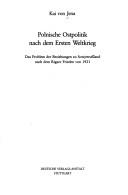
ISBN: 3421019657 3486703404 9783421019653 Year: 1980 Volume: 40 Publisher: Stuttgart Deutsche Verlags-Anstalt
Abstract | Keywords | Export | Availability | Bookmark
 Loading...
Loading...Choose an application
- Reference Manager
- EndNote
- RefWorks (Direct export to RefWorks)
Den Westgrenzen des nach dem Ersten Weltkrieg wiedererstandenen Polen, wie sie im Versailler Vertrag festgelegt waren, entsprachen keine vergleichbaren Grenzregelungen im Osten. Erst die Ergebnisse des polnisch-sowjetischen Krieges schufen eine im Rigaer Frieden von 1921 vereinbarte polnische Ostgrenze. Sie trug freilich bereits den Keim neuer Konflikte in sich, da sie weder einen polnischen Nationalstaat - das Ziel der polnischen Nationaldemokratie - noch den Traum Pilsudskis - die Zerschlagung Russlands - verwirklichte. Dies ist der Ausgangspunkt des Buches, das zeigt wie Pilsudski seine Politik im Osten auch nach Abschluss des Rigaer Friedens fortzuführen versuchte. Auf welche Kräfte stützte sich dabei der polnische Staatschef? Wie verhielt sich Polens Verbündeter Frankreich dazu? Welche Bedeutung kam bei dieser Politik den baltischen Staaten zu? Welche Rolle spielten Großbritannien und Deutschland? In welchem Maße beeinflussten wirtschaftliche Interessen diese Politik und welche Strategie entwickelte Sowjetrussland? Auf all diese Fragen gibt die Untersuchung v. Jenas, gestützt auf neue polnische und sowjetische Dokumente sowie auf eine Fülle bislang unbekannter und erstmals ausgewerteter Quellen des Auswärtigen Amtes, des Foreign Office und des Quai d`Orsey eine schlüssige Antwort. Der Autor zeigt treffend, wie die antisowjetische Politik Pilsudskis zu einer Stärkung seiner innenpolitischen Gegner führte, deren Ziel einer dauerhaften Entspannung zwischen Polen und Sowjetrussland aber infolge einer neuen europäischen Konstellation, die eine Annäherung Moskaus an Berlin bewirkte, nicht erreicht werden konnte.
Soviet Union --- Poland --- Foreign relations --- -Soviet Union --- -Foreign relations --- -Poland --- -Poland -- Foreign relations -- Soviet Union. --- Soviet Union -- Foreign relations -- Poland. --- Soviet Union -- Foreign relations. --- Regions & Countries - Europe --- History & Archaeology --- Russia & Former Soviet Republics --- Foreign relations. --- Poland -- Foreign relations -- Soviet Union. --- HISTORY / General. --- Soviet Union - Foreign relations - Poland --- Poland - Foreign relations - Soviet Union --- Soviet Union - Foreign relations
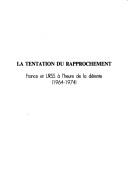
ISSN: 07681984 ISBN: 2859442103 9791035103941 9782859442101 Year: 1991 Volume: 41 Publisher: Paris Publications de la Sorbonne
Abstract | Keywords | Export | Availability | Bookmark
 Loading...
Loading...Choose an application
- Reference Manager
- EndNote
- RefWorks (Direct export to RefWorks)
Au début des années 60, l’Etat français conduit par le général de Gaulle s’engage, « au nom de l’histoire et de la géographie », dans une politique de rapprochement avec l’Etat soviétique, lui-même soucieux à ce moment de s’ouvrir à (’Occident. C’est le début de la détente, période originale, complexe, qui met un terme à l’ère relativement linéaire de la guerre froide ; l’Etat français fait alors figure de précurseur. Poursuivie sous la présidence de Georges Pompidou, la détente bilatérale, encadrée par des rencontres au sommet et des concertations politiques régulières, se concrétise : à l’accroissement sensible des échanges commerciaux répondent le développement de la coopération économique et scientifique et l’essor des relations culturelles. Pourtant, en dépit de ses succès, la détente franco-soviétique n’a pu se délivrer d’un certain nombre d’appréhensions réciproques et s’est essoufflée, vite dépassée par l’entente américano-soviétique et le rapprochement germano-soviétique, dans l’indifférence de l’opinion française. Peut-on analyser et expliquer ce phénomène ambigu ?
International groups --- France --- Foreign relations --- Relations extérieures --- Histoire des relations internationales --- --France --- --URSS, --- 1964-1974 --- --Soviet Union --- Relations extérieures --- URSS, 1922-1991 --- Soviet Union - Foreign relations - France --- France - Foreign relations - Soviet Union --- Soviet Union --- History --- État soviétique --- détente --- Occident --- État français --- relation culturelle --- entente américono-soviétique --- opinion française
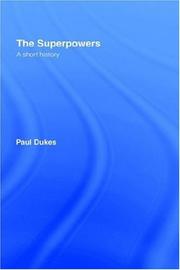
ISBN: 1280329556 113458153X 0203171594 0203130936 9780203171592 9780203130933 0415230411 9780415230414 041523042X 9780415230421 0203179978 9780203179970 9781280329555 9781134581481 9781134581528 9781134581535 1134581521 1933305916 Year: 2000 Publisher: London : Routledge,
Abstract | Keywords | Export | Availability | Bookmark
 Loading...
Loading...Choose an application
- Reference Manager
- EndNote
- RefWorks (Direct export to RefWorks)
The Superpowers traces the development of the USA and Russia (later USSR) from 1898 through to 2000, placing the Cold War, from inception to ending, into the wider social, economic and political context. This is the first history of the two major participants and their relationship throughout the twentieth century.The Superpowers: explores the intertwining history of the two powers chronologically and includes discussion of: * the inheritance of the two great powers and their imperial background * World War One and the Russian Revolution * Capitalism and Soci
Cold War. --- Imperialism. --- United States - History. --- Imperialism --- Cold War --- United States - General --- Regions & Countries - Americas --- History & Archaeology --- World politics --- History --- United States --- Russia --- Soviet Union --- History. --- Foreign relations. --- Foreign relations --- Imperialism - History --- United States - History --- Russia - History --- Soviet Union - History --- United States - Foreign relations --- Russia - Foreign relations --- Soviet Union - Foreign relations
Book
ISBN: 1282505416 9786612505416 0739160540 9780739160541 9780739160541 9780739145630 9780739107362 Year: 2010 Publisher: Lanham, Md. Lexington Books
Abstract | Keywords | Export | Availability | Bookmark
 Loading...
Loading...Choose an application
- Reference Manager
- EndNote
- RefWorks (Direct export to RefWorks)
Russia's Life-Saver brilliantly examines the diplomatic rationale for and results of the U.S. decision to grant over 12 billion in Lend-Lease aid to Soviet Russia during World War II. Author Albert L. Weeks wields many facts and statistics never before published in the U.S. Of particular interest is the statement by Soviet Army Marshal Georgy K. Zhukov that U.S. Lend-Lease aid was indispensable, despite Soviet propaganda that sought to minimize its importance.
Lend-lease operations (1941-1945). --- Soviet Union -- Foreign relations -- United States. --- Soviet Union -- Military relations -- United States. --- United States -- Foreign relations -- Soviet Union. --- United States -- Military relations -- Soviet Union. --- World War, 1939-1945 -- Equipment and supplies. --- Lend-lease operations (1941-1945) --- World War, 1939-1945 --- Equipment and supplies. --- United States --- Soviet Union --- Foreign relations --- Military relations
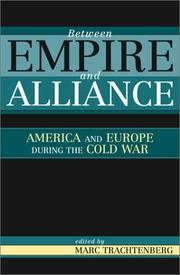
ISBN: 074252177X 0742521761 1299783112 0585455104 9780585455105 9780742521773 9780742521766 9780742521773 Year: 2003 Publisher: Lanham, Md Rowman & Littlefield
Abstract | Keywords | Export | Availability | Bookmark
 Loading...
Loading...Choose an application
- Reference Manager
- EndNote
- RefWorks (Direct export to RefWorks)
Written by scholars from both sides of the Atlantic, the work discusses the role European dependence on American support played in the history of European unification.
Cold War. --- World politics --- Europe -- Politics and government -- 1945-. --- North Atlantic Treaty Organization -- History. --- Soviet Union -- Foreign relations -- United States. --- United States -- Foreign relations -- Soviet Union. --- World politics -- 1945-1989. --- Cold War --- History & Archaeology --- History - General --- North Atlantic Treaty Organization --- Coexistence (World politics) --- North Atlantic treaty organisation --- Peaceful coexistence --- NAVO --- OTAN --- History. --- United States --- Soviet Union --- Europe --- Foreign relations --- Politics and government --- World history --- International groups --- anno 1900-1999 --- NATO --- VIE INTERNATIONALE --- HISTOIRE --- 1945-1989 --- ALLIANCE --- ORGANISATIONS INTERGOUVERNEMENTALES
Book
ISBN: 9780739142233 9780739142226 0739142224 0739142240 9780739142240 0739142232 1282479210 9786612479212 9781282479210 6612479213 Year: 2010 Publisher: Lanham Lexington Books
Abstract | Keywords | Export | Availability | Bookmark
 Loading...
Loading...Choose an application
- Reference Manager
- EndNote
- RefWorks (Direct export to RefWorks)
In this book an international group of scholars examines China's acceptance and ultimate rejection of Soviet models and practices in economic, cultural, social, and other realms.
Communism and culture --- Communism --- Education --- History --- China --- Soviet Union --- Politics and government --- Social conditions --- Foreign relations --- Economic conditions --- China --Economic conditions --1949-. --- China --Foreign relations --Soviet Union. --- China --Politics and government --1949-. --- China --Social conditions --1949-. --- Communism and culture --China. --- Communism --China --History --20th century. --- Education --China --History --20th century. --- Soviet Union --Foreign relations --China. --- Regions & Countries - Asia & the Middle East --- East Asia --- History & Archaeology
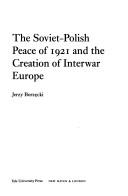
ISBN: 9786612353352 0300145012 1282353357 1282088734 9786612088735 9780300145014 9781282088733 0300121210 9780300121216 9781282353350 661235335X 6612088737 Year: 2008 Publisher: New Haven : Yale University Press,
Abstract | Keywords | Export | Availability | Bookmark
 Loading...
Loading...Choose an application
- Reference Manager
- EndNote
- RefWorks (Direct export to RefWorks)
The Soviet-Polish peace treaty of 1921, also known as the "Riga peace," ended the war of 1919-1920 and may be considered the most important Eastern European treaty of the interwar period. This deeply researched book offers the first post-Soviet account of how Bolshevik Russia and Poland came to sign the treaty-a pact that established the central part of the Soviet western border and provided Eastern Europe with a measure of stability that lasted until 1939. Jerzy Borzecki draws on a wealth of untapped materials in Russian and Polish archives to recreate the negotiations and behind-the-scenes maneuvers leading to and surrounding the treaty. He examines the significance of the agreement not only to its signatories but also to Ukraine, Belarus, Lithuania, and Latvia. The Riga peace represented an authentic compromise between Poland and Bolshevik Russia, Borzecki shows, and he offers new interpretations of other crucial aspects of the negotiations as well.
Russo-Polish War, 1919-1920 --- Polish-Russian War, 1919-1920 --- Russo-Polish Campaign, 1920 --- Diplomatic history. --- Territorial questions. --- Poland. --- Poland --- Soviet Union --- Europe --- Council of Europe countries --- Eastern Hemisphere --- Eurasia --- Foreign relations --- Boundaries. --- Poland. -- Treaties, etc. -- Soviet Union, -- (1921 Mar. 18). --- Russo-Polish War, 1919-1920 -- Diplomatic history.. --- Russo-Polish War, 1919-1920 -- Territorial questions.. --- Poland -- Foreign relations -- Soviet Union.. --- Soviet Union -- Foreign relations -- Poland.. --- Europe -- Boundaries.. --- Europe -- Foreign relations -- 1918-1945.
Book
ISBN: 1280031387 0203168801 9780203168806 9781134997633 9781134997671 9781134997688 9780044459972 9786610031382 Year: 2003 Publisher: London New York Unwin Hyman
Abstract | Keywords | Export | Availability | Bookmark
 Loading...
Loading...Choose an application
- Reference Manager
- EndNote
- RefWorks (Direct export to RefWorks)
This textbook examines Soviet thinking in the economic, political and military spheres, linking domestic and foreign policies. Part One describes the evolution of its foreign policy; Part Two, details the impact it had on the rest of the world (by region).
Russia & Former Soviet Republics --- Regions & Countries - Europe --- History & Archaeology --- Gorbachev, Mikhail Sergeevich. --- Soviet Union - Foreign relations - 1985-1991. --- Gorbachev, Mikhail Sergeevich, --- Soviet Union --- Foreign relations --- Gorbatchev, Mikhaïl --- Gorbačov, Michail, --- Gorbatschow, Michail, --- Gorbachev, M. S. --- Gorbachov, Mikhail, --- Gorbachov, M. S., --- Gorbaciov, Michail Sergeevic, --- Gorbachev, Mijaíl, --- Ko-erh-pa-chʻiao-fu, --- Ghūrbātshūf, --- Gorbatsjov, Michail, --- Gorbaczow, Michaił, --- Jūrbātshūf, Mīkhāʼīl, --- Gorbaciov, Mikhail Sergejevic, --- Gorubachofu, Mihairu, --- Gorbachov, Mijail S., --- Kō̜kbāsep, Mikhāʻīn, --- Gkormpatsoph, M., --- Gorbačëv, Michail, --- Gorbacsov, Mihail, --- Ko-pa-chʻi-fu, M., --- Gorbats'ov, Mikhaʼel, --- Gorbaciov, Mihail, --- Gorbachov, Michael, --- Gorbatxov, Mikhaïl Serguèievitx, --- Gorbatšov, Mihail, --- Горбачев, Михаил Сергеевич, --- גורבצ׳ב, מיכאל סרגייביץ׳, --- גורבצ׳וב --- 戈爾巴喬夫, --- Gorbachev, Mikhail Sergeevich --- Горбачев, Михаил Сергеевич --- Gorbatchev, Mikhaïl,
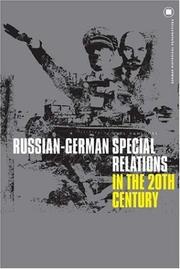
ISBN: 1282545620 9786612545627 1847883176 9781847883179 9781845201777 9781847883179 1845201779 Year: 2006 Volume: 19 Publisher: Oxford New York, NY Berg
Abstract | Keywords | Export | Availability | Bookmark
 Loading...
Loading...Choose an application
- Reference Manager
- EndNote
- RefWorks (Direct export to RefWorks)
Examines Russia and Germany's turbulent relationship, including the pre-1914 era of exchange and cooperation; the projects of modernity in post-revolutionary Russia and Weimar Germany; the struggle for dominance over Central Europe in World War II; and mutual views of Germans and Russians after 1945.
Germany -- Foreign relations -- 20th century. --- Germany -- Foreign relations -- Russia. --- Germany -- Foreign relations -- Soviet Union. --- Russia -- Foreign relations -- 20th century. --- Russia -- Foreign relations -- Germany. --- Soviet Union -- Foreign relations -- Germany. --- Germany --- Regions & Countries - Europe --- History & Archaeology --- International relations. --- Russia --- Soviet Union --- Foreign relations --- Coexistence --- Foreign affairs --- Foreign policy --- Global governance --- Interdependence of nations --- International affairs --- Peaceful coexistence --- World order --- Weimar Republic --- Germanii︠a︡ --- Германия --- BRD --- FRN --- Jirmānīya --- جرمانيا --- Nimechchyna --- Gjermani --- Federalʹna Respublika Nimechchyny --- Veĭmarskai︠a︡ Respublika --- Ashkenaz --- Germanyah --- Bundesrepublik Deutschland --- Federal Republic of Germany --- Deutschland --- Repoblika Federalin'i Alemana --- República Federal de Alemania --- Alemania --- República de Alemania --- Bu̇gd Naĭramdakh German Uls --- Kholboony Bu̇gd Naĭramdakh German Uls --- KhBNGU --- ХБНГУ --- German Uls --- Germania --- Republika Federal Alemmana --- Deutsches Reich --- Grossdeutsches Reich --- Weimarer Republik --- Vācijā --- Russie --- Rossīi︠a︡ --- Rossīĭskai︠a︡ Imperīi︠a︡ --- Russia (Provisional government, 1917) --- Russia (Vremennoe pravitelʹstvo, 1917) --- Russland --- Ṛusastan --- Russia (Tymchasovyĭ uri︠a︡d, 1917) --- Russian Empire --- Rosja --- National security --- Sovereignty --- World politics --- Germany (Territory under Allied occupation, 1945-1955) --- Germany (Territory under Allied occupation, 1945-1955 : British Zone) --- Germany (Territory under Allied occupation, 1945-1955 : French Zone) --- Germany (Territory under Allied occupation, 1945-1955 : Russian Zone) --- Germany (Territory under Allied occupation, 1945-1955 : U.S. Zone) --- Germany (East) --- Germany (West) --- Holy Roman Empire --- Russian S.F.S.R. --- Russia (Territory under White armies, 1918-1920) --- ドイツ --- Doitsu --- ドイツ連邦共和国 --- Doitsu Renpō Kyōwakoku --- ドイツ レンポウ キョウワコク --- Allemagne --- URSS --- Relations extérieures --- Deguo --- 德国 --- Gėrman --- Герман Улс
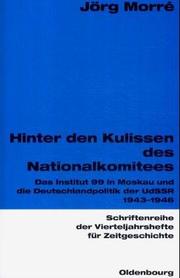
ISBN: 348664582X 3486702947 Year: 2001 Publisher: München Oldenbourg
Abstract | Keywords | Export | Availability | Bookmark
 Loading...
Loading...Choose an application
- Reference Manager
- EndNote
- RefWorks (Direct export to RefWorks)
Das Institut 99, das im Hintergrund der Aktivitäten des Nationalkomitees ""Freies Deutschland"" agierte, war für die Organisation der gesamten ""antifaschistischen Erziehungsarbeit"" in den sowjetischen Kriegsgefangenenlagern zuständig. Ihm unterstanden die Antifa-Schulen, in denen deutsche Kriegsgefangene zu kommunistischen Kadern geschult werden sollten. Damit war es eine viel einflussreichere Institution, als es die Erinnerungen einiger kriegsgefangener NKFD-Mitglieder darstellen, die es als Moskauer Stadtkomitee beschreiben. Der Autor zeichnet die Entwicklung des ""wissenschaftlichen Forsc
355.4 <43> --- 355.4 <47> --- Oorlogvoering. Tactiek en strategie. Oorlogsoperaties. Militaire operaties. Operatieterrein--Duitsland voor 1945 en na 1989 --- Oorlogvoering. Tactiek en strategie. Oorlogsoperaties. Militaire operaties. Operatieterrein--Rusland. Sovjet-Unie --- Nationalkomitee "Freies Deutschland" --- -Bewegung "Freies Deutschland" --- Free Germany National Committee --- "Freies Deutschland" (Committee) --- N.F.D. --- N.K.F.D. --- National Committee for a Free Germany --- National Committee for Free Germany --- National Committee for German Freedom --- National Committee Free Germany --- National Committee of "Free Germany" --- National Komitee "Freies Deutschland" --- National Komitee für ein "Freies Deutschland" --- Nationalkomitee für ein "Freies Deutschland" --- Nat︠s︡ionalʹnyĭ komitet "Svobodnai︠a︡ Germanii︠a︡" --- NFD --- NKFD --- NKSG --- History --- Germany --- Soviet Union --- -Foreign relations --- -355.4 <43> --- -History --- 355.4 <47> Oorlogvoering. Tactiek en strategie. Oorlogsoperaties. Militaire operaties. Operatieterrein--Rusland. Sovjet-Unie --- 355.4 <43> Oorlogvoering. Tactiek en strategie. Oorlogsoperaties. Militaire operaties. Operatieterrein--Duitsland voor 1945 en na 1989 --- -Germany -- Foreign relations -- Soviet Union. --- International relations. --- Soviet Union -- Foreign relations -- Germany. --- Regions & Countries - Europe --- History & Archaeology --- History. --- Foreign relations --- Germany -- Foreign relations -- Soviet Union. --- Bewegung "Freies Deutschland" --- HISTORY / General.
| Listing 1 - 10 of 12 | << page >> |
Sort by
|

 Search
Search Feedback
Feedback About UniCat
About UniCat  Help
Help News
News